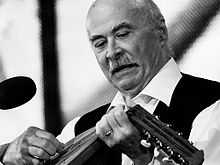Tudor Gheorghe
| Tudor Gheorghe | |
|---|---|
 Tudor Gheorghe on stage in 2008, at Sala Palatului in Bucharest | |
| Born |
Gheorghe Tudor August 1, 1945 Podari, Romania |
| Residence | Craiova, Romania |
| Occupation | Singer-songwriter, actor, poet, writer |
| Years active | 1966–present |
| Religion | Orthodox Christianity |
| Spouse(s) | Georgeta Luchian-Tudor (m. 1966) |
| Children |
|
|
Musical career | |
| Genres | Folk, Romanian peasant music, Romanian popular music, lăutărească, spoken word, classical |
| Instruments | Vocals, guitar, cobza |
| Labels | Electrecord, Illuminati Creatio, Cat Music |
| Associated acts | Marin Sorescu, Nichita Stănescu, Adrian Păunescu, Romulus Vulpescu, Mircea Micu, Marius Hristescu |
Tudor Gheorghe (Romanian pronunciation: [ˈtudor ˈɡe̯orɡe]; born August 1, 1945) is a Romanian musician, actor, and poet known primarily for his politically charged musical career and his collaborations with well-known figures of late 20th-century Romanian poetry. His recording work is sometimes associated with anti communist activism and has received much critical acclaim during the years. The son of an Iron Guard member, he was banned from performing and recording in 1987 after a concert at Sala Palatului in Bucharest, following a number of run-ins with Romania's communist authorities throughout the 1970s and 1980s.[1][2][3][4]
Tudor started out as an actor, graduating from the Caragiale Academy of Theatrical Arts and Cinematography in Bucharest in 1966 and later started composing music as a means of expressing his interest in Romanian poetry. His first national tour in 1969 was critically and commercially acclaimed and established him as a figure of the fledgling contemporary folk scene in Romania.[5][6] His recording career, spanning fifty years, has frequently defied pop music conventions while exploring various traditions in Romanian music, from folk, religious music, the anti-communist anthems of Jean Moscopol to popular music of interwar Romania, at times embracing even children's or classical music.[7][8] He has mostly performed with a guitar or cobza with no backing musicians or vocalists but, starting in the early 2000s, he has incorporated orchestras, choirs, and tarafs into his performances. He resumed his musical career in 1992 but, dissatisfied with the way promoters wanted to market his music, took another six year break from performing live. He has been touring constantly since 1998 and has recorded most of his concerts, releasing them as albums and generally avoiding studio work.[9][10]
Throughout his career, Tudor Gheorghe has been praised as a performer and songwriter by a number of Romanian literary figures. The poet and playwright Marin Sorescu addressed his personal relationship with Tudor in 1988 by saying that "Every time I listen to his music [...] Tudor Gheorghe reinforces my hunch that Romanian poetry [...] can move mountains", while Adrian Păunescu described him as "a great poet who negletcs his talent".[11][12] The University of Craiova and the Constantin Brâncuși University of Târgu Jiu have awarded him doctor honoris causa titles for his contributions to Romanian music and culture and both Romania and the Republic of Moldova have decorated him with the Order of the Star of Romania and The Republic's Order, respectively.[13][14][15][16][17]
Discography
Studio albums
|
|
References
Footnotes
- ↑ Ciobanu, Luminița (September 28, 2009). "Povestea unui spectacol interzis". Jurnalul Național (Bucharest). Retrieved April 8, 2015.
- ↑ "Tudor Gheorghe, cantautor: „Visam să fiu profesor de Limbă Română“". Lifestyle (Bucharest: Adevărul). December 29, 2011. Retrieved 8 April 2015.
- ↑ Ciobanu, Luminița (25 September 2009). ""Pe-un franc poet" - Caragiale tălmăcit de Tudor Gheorghe". Music (Jurnalul Național). Retrieved 2 February 2015.
- ↑ Victor Ciutacu (September 28, 2012). "Tudor Gheorghe, despre textul "fără farafaslâcuri" al lui Caragiale". Antena 3. Retrieved September 10, 2014.
- ↑ "Interviu - Tudor Gheorghe - Cei ce canta n-apuca sa-njure!". metropotam.ro. Retrieved September 12, 2014.
- ↑ http://podari.ro/tudor%20gheorghe.html
- ↑ Păuna, Eveline (15 January 2010). "Tudor Gheorghe: "Au facut copiii nostri dinti, musca din bunici si din parinti"". Music (Q Magazine).
- ↑ Mixich, Vlad (12 December 2007). "Tudor Gheorghe: Nu am fugit in SUA pentru ca pe mama o durea un picior". Culture (Hotnews.ro). Retrieved 12 December 2014.
- ↑ http://www.zi-de-zi.ro/marius-hristescu-oaspetele-filarmonicii
- ↑ http://www.basarabeni.ro/stiri/cultura/eu-sunt-cobzarul-generatiilor--1053/
- ↑ http://www.mediafax.ro/cultura-media/tudor-gheorghe-incepe-turneul-ce-am-avut-si-ce-am-pierdut-la-craiova-10487541
- ↑ http://www.libertatea.ro/detalii/articol/interviu-exclusiv-tudor-gheorghe-dracu-vedeta-fetele-capatos-466874.html
- ↑ http://www.gandul.info/magazin/video-tudor-gheorghe-implineste-joi-68-de-ani-11190408
- ↑ http://www.gandul.info/stiri/tudor-gheorghe-a-primit-titlul-de-doctor-honoris-causa-al-universitatii-din-craiova-9106886
- ↑ http://adevarul.ro/locale/targu-jiu/tudor-gheorghe-doctor-honoris-causa-universitatii-constantin-brancusi-1_536a9a8a0d133766a8735a13/index.html
- ↑ http://www.antena3.ro/timp-liber/cultura/tudor-gheorghe-a-devenit-doctor-honoris-causa-al-universitatii-din-craiova-149517.html
- ↑ http://www.moldova.org/tudor-gheorghe-decorat-cu-cea-mai-inalta-distinctie-214133-rom/
|